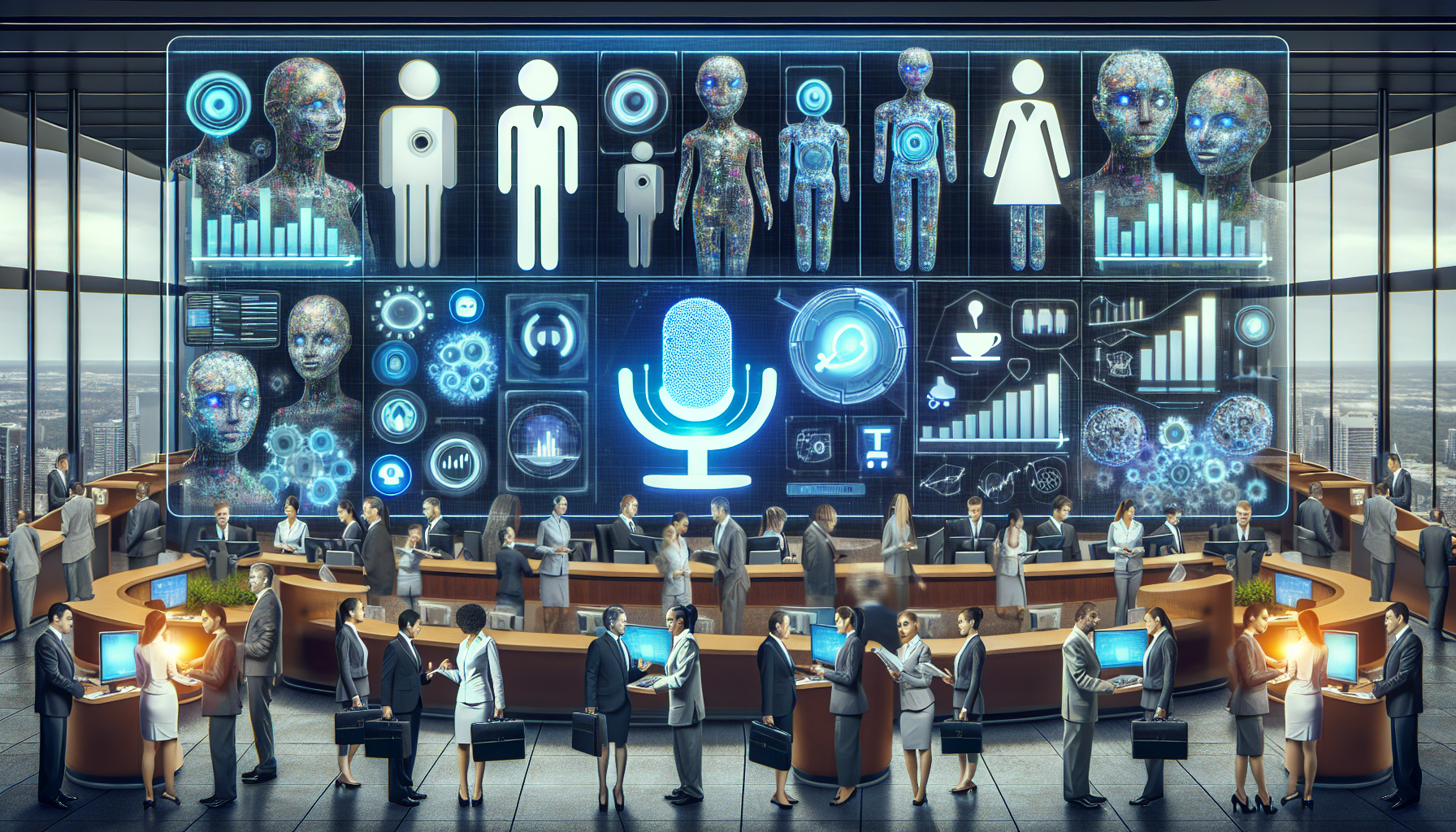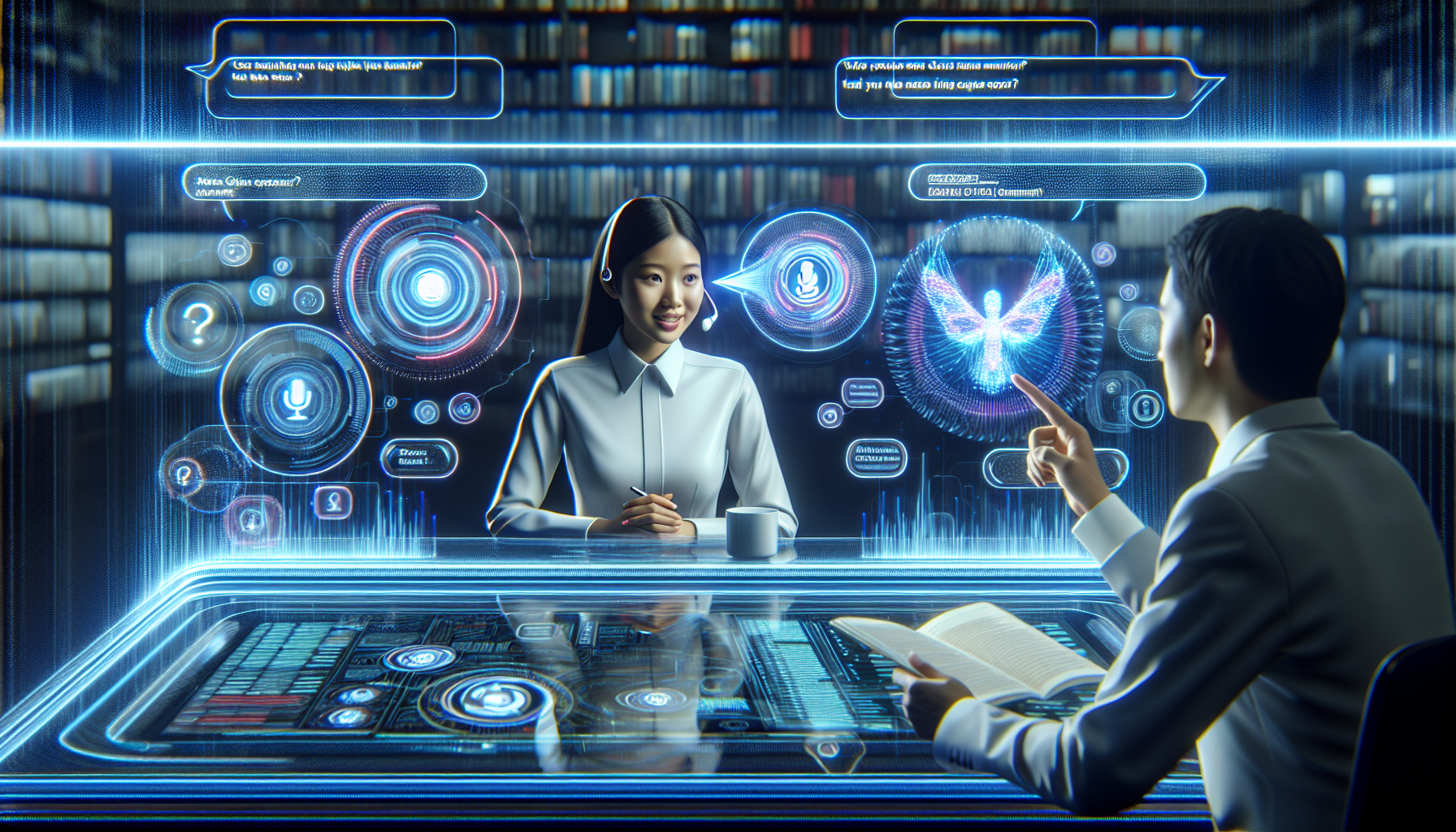
As society continues its progression towards complete digitalization, businesses are seeking to optimize consumer communication in effortless and sophisticated ways. One of such ways is the utilization of AI Receptionists.

Delegating a multitude of front-desk tasks to Artificial Intelligence (AI), AI Receptionists are efficient, automated systems designed to handle customer service with precision and speed. The core functionality of these AI receptionists is typically centered around natural language processing (NLP) technologies, enabling them to comprehend and respond to human conversation. IBM - Natural Language Processing An AI receptionist can handle unlimited parallel conversations, displaying an unmatched efficiency during peak business hours.
An AI receptionist system responds to inquiries in real time, thus eliminating the inevitable latency of human intervention. They can provide instant information about products and services, manage bookings, route calls, and even facilitate transactions. The round-the-clock availability of these virtual assistants offers a sturdy backbone of support for businesses that operate beyond conventional time limits. Microsoft - Voice Interaction at Work
This growing trend seamlessly merges with the rise of Voice Search Optimization, paving the way for an immersive conversational experience. Voice search optimization capitalizes on voice-recognition technology to provide accurate, fast, and personalized user experiences. The intersection of AI receptionist systems and voice search optimization marks a significant leap in customer-business interaction.
In all, the adoption of AI receptionists proves advantageous in enhancing customer satisfaction, streamlining operations, and allowing businesses to stay ahead in the game of digital evolution.
Once upon a time, your first point of contact with a business was a human receptionist; a gatekeeper who answered phones, took messages, and generally ensured that your inquiries were directed to the right person or department. However, as technological advancements have continued to evolve, the traditional receptionist role is being usurped by a digital counterpart; the AI Receptionist.
The emergence of AI-driven solutions in customer service is primarily designed to streamline operations and make businesses more efficient. AI Receptionists not only offer an effective way of managing high volumes of customer inquiries but also help businesses save on operational costs. Compared to human receptionists who are limited by working hours and individual capabilities, AI receptionists can handle multiple queries simultaneously and are available 24/7, ensuring customer satisfaction and retention.
In addition to this, AI receptionists are perfectly suited to handle the emerging trend of Voice Search Optimization. Voice search is not just a passing fad; it's gaining popularity and altering the way information is searched on the internet. AI receptionists, with their natural language processing abilities, are well equipped to understand and respond to voice search queries, offering a more personalized and dynamic customer service experience.
Embracing AI receptionists and voice search optimization is not just about keeping up with modern trends but preparing for the future. As technology continues to evolve, the demand for quick, efficient, and customer-centric services will only increase. Not only will early adoption of these technologies give businesses a competitive edge, but it will also future-proof them in an increasingly digital world. This disruption promises a revolutionary change in customer service, making it crucial for businesses to adapt or risk being left behind.
```Advancements in technology, particularly in the fields of artificial intelligence (AI) and voice search optimization, are revolutionizing the ways businesses interact with their customers. These technologies, when combined, can create an AI receptionist capable of understanding and processing natural language queries, thereby providing a more seamless end-user experience.

An AI receptionist, or a virtual assistant, is not a new concept, but the integration of voice search capabilities takes it a notch higher. The traditional chatbot model based on programmed responses is evolving into something more nuanced. Entrepreneurs are leveraging AI-driven voice search technology to make their virtual receptionists more "human," with an ability to comprehend speech patterns and dialects and respond appropriately.
For instance, Google's Google Assistant utilizes AI to process natural language queries effectively. This transformative technology is the backbone of AI receptionists, allowing these virtual entities to understand how humans communicate rather than just what they are saying. Integrating voice search with AI receptionists opens doors for businesses to facilitate effortless conversations, resolving customer inquiries in real-time.
Of course, perfection is a journey in the realm of technology. There are challenges in fine-tuning voice search to be fully compatible with AI receptionists, including the need for voice analytics to decipher accents, dialects, and colloquialisms. However, as AI technology continues to evolve at a breakneck pace, these issues are being addressed with significant success.
Businesses are heading toward a future where AI receptionists can not only engage in intuitive dialogue but also anticipate customer inquiries based on behavioral patterns and preferences. Those who are prepared to adapt and implement these technological shifts will be positioned to deliver superior customer service and sharpen their competitive edge.
As businesses continue to evolve their digital footprint, the implementation of AI receptionists is leading the way towards operational efficiency and improved customer interaction. Several organizations across different sectors have had tremendous success with this technology. Let's take a closer look at some prominent case studies that underline the pivotal role of AI receptionists and voice search optimization.
iFLYTEK Co., Ltd., a leading Chinese information technology company, showcased a tangible improvement in customer interactions with the deployment of an AI-based voice assistant. Their AI receptionist, not only managed call routing with higher efficiency but also significantly reduced waiting times for customers. By providing swift responses, the AI receptionist minimized customer frustration and improved overall customer satisfaction.
In the hospitality sector, an international hotel chain, Edwardian Hotels London, introduced 'Edward', an AI-based virtual host. Edward proved to be more than just a virtual check-in assistant. It established contact with guests via text messages, took care of all their queries, and provided tailored recommendations, thus enhancing the overall guest experience. The robust platform also facilitated internal communications, aiding in quick attendance to room service requests and maintenance issues.
Moving onto the world of e-commerce, Shopify integrated AI-powered chatbots into their online storefronts to assist customers in real-time. Not only did this boost customer engagement but also streamlined the helpdesk, providing immediate and personalized support. This simplified shopping experience resulted in high customer retention and increased sales.
As these case studies exemplify, the deployment of AI receptionists significantly optimizes voice search and enhances operational efficiency. This innovative approach in customer service delivery not only leads to improved customer satisfaction but also contributes to the organization's bottom line.
```Emerging technologies continue to define the extent of their capabilities, with the rise of Artificial Intelligence being no exception. As the promise of AI progresses from concept to reality, two areas with significant potential emerge: AI-based receptionists and Voice Search Optimization (VSO), both offering unprecedented opportunities for business operations and customer engagement.

Companies such as Mitsuku are offering AI-powered receptionist solutions that can handle a multitude of tasks. From managing appointments to answering frequently asked questions, these virtual assistants are revolutionizing the customer service industry. The AI's ability to adapt to evolving customer behaviors while offering 24/7 availability suggests a future where most mundane customer service tasks may be entrusted to machine learning algorithms.
Simultaneously, we are witnessing the continuous growth of Voice Search Optimization (VSO), thanks largely to digital voice assistants such as Google Assistant, Amazon Alexa, and Apple’s Siri. The significant rise in usage of these assistants means that businesses must optimize their online content for voice search. This includes focusing on natural language processing, long-tail keywords and a great emphasis on local SEO.
A juncture is forming where advanced AI receptionists could be integrated with VSO strategies, creating an ecosystem that goods or services can be located, ordered, and dispatched without human intervention. This level of automation not only streamlines certain business processes but could also reshape the customer journey by offering a truly personalized experience.
In conclusion, harnessing the power and precision of AI receptionists and VSO requires foresight, acceptance of AI as a game-changing technology and the readiness to embrace a future where automation defines the new norms of customer interactions and business operations.
The advent of AI receptionists is a major feat in the sphere of business operations. With such emerging technology, businesses have a unique opportunity to revolutionize their customer service and streamline operational workflows. Herein, we focus on practical advice to embark on the journey to integrating AI receptionists into your business system. This includes setup, customization, and integration with existing systems and workflows.
The foremost step in implementing an AI receptionist is finding the right AI system that suits your business needs. Comb through the market for an AI solution with versatile functionality, high adaptability, and advanced conversational skills.
Once a suitable system is identified, initial set up begins involving training the AI according to specific business requirements. Generally, the setup phase includes programming the AI to handle basic receptionist tasks such as scheduling meetings, handling calls, and dealing with repetitive customer enquiries. The degree to which you want to automate such tasks depends on your business's readiness for AI.
Up next, customizing your AI receptionist is vital in aligning it with your business values and its unique demands. Tailoring the AI’s voice, tone, and responses to match your business persona enhances brand consistency. This stage also includes teaching your AI receptionist to respond accurately to voice search queries. Such optimization is crucial for the increasing number of customers using voice assistants.
Lastly, integrating the AI receptionist into your existing workflows should be seamless. This involves connecting the AI system with your back-end systems and databases to enable intelligible interactions with customers. Simultaneously, look to enhance collaboration between AI receptionists and human staff.
Foreseeing the future with AI receptionists and voice search optimization is not just a trend, but a strategic step towards enhancing customer service efficiency. So, remember, the earlier you integrate, the better you adapt to the foreseeable digital future.
```Start your free trial for My AI Front Desk today, it takes minutes to setup!








